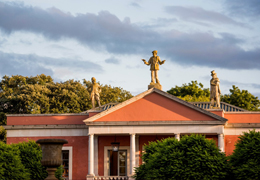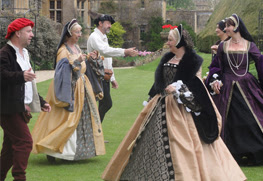 Cotswolds luxury hotels are a great base for exploring local arts events.
Cotswolds luxury hotels are a great base for exploring local arts events. The local list of events is extensive - a kind of Cotswolds ‘Season’. There are some real surprises too.
For example, the North Cotswolds has its very own opera house. Longborough Festival Opera is, in fact one of the UK's finest country opera houses - an intimate 500 seat theatre set amidst the glorious rolling hills of the Cotswolds. Each performance at Longborough is a new production, created especially for the venue - the Producers work with talented designers, directors, conductors and the best up-and-coming artists to bring you something you won't have seen anywhere else.
A visit to Longborough ensures an intimate and unique experience which truly captures the drama and emotion happening on stage. It was once reviewed as ‘like Glyndbourne before the war’. A visit fits nicely with a stay at one of the Cotswolds luxury hotels, in keeping somehow.
The season runs to the start of August with a chance left to see Mozart’s The Magic Flute or Gluck’s Orfeo ed Euridice. Dining is an important part of the experience at Longborough Festival Opera. 90 minute dining interval allows time to relax and enjoy the picturesque grounds: you can reserve a space in the on site restaurant or bring a picnic.
Highly recommended - especially as part of a longer stay at one of the cotswolds luxury hotels in the Cotswolds Finest partnership.
Theatre and Cotswolds Luxury Hotels
 Theatre isn’t, perhaps, the first thought when planning a Cotswolds luxury hotels break. But perhaps it should be.
Theatre isn’t, perhaps, the first thought when planning a Cotswolds luxury hotels break. But perhaps it should be.
Apart from the fact that Stratford-Upon-Avon’s Royal Shakespeare Theatre is within easy range of much of the Cotswolds, you’ll find a heady mix of local theatres and out-door events on offer. For those in the know, there’s a regular program of musical theatre, comedy and touring productions - including one or two places known locally as secret try out venues for the odd big name.
Chipping Norton Theatre is a theatre, an arthouse cinema, a gallery and a concert hall. Praised by The Guardian for “A programme of distinctive artistic adventure”, the theatre is small but punches well above its weight. Seats 213 people.
Further south, the Sundial Theatre in Cirencester is a 275 seat venue always worth checking out. The likes of Michael McIntyre and Jack Dee have appeared in warm up gigs here.
Giffords Circus tours village green type settings through the summer - a very stylish night out and not to be missed if they’re performing near you during your stay at one of the Cotswolds luxury hotels.
Look out too for Shakespeare performances from Rain or Shine Theatre Company at venues such as Painswick Rococo Garden.
The Everyman Theatre in Cheltenham is the house theatre for the area - a delightful Frank Matcham designed venue. Farthest south in the area, Bath’s Theatre Royal, built in 1805 is, famously, haunted and one of the oldest theatres in the country.
Cotswolds luxury hotels are your key to unlock the best of local culture, whether local opera, theatre or cultural events.
 2017 has been declared the year of literary heroes by VisitEngland in a drive to celebrate the importance of authors and poets in the country. We took a look at our own hotels and inns in the Cotswolds to dig our some literary connections - and found a few surprises along the way!
2017 has been declared the year of literary heroes by VisitEngland in a drive to celebrate the importance of authors and poets in the country. We took a look at our own hotels and inns in the Cotswolds to dig our some literary connections - and found a few surprises along the way! If Shakespeare did live in Dursley , it’s pleasing that J.K. Rowling also contributed to that town’s fame by naming the family in her stories after the place too. J.K. was at school near the Forest of Dean and a couple of references popped up in her stories. The filmed stories used Gloucester Cathedral as a location.
If Shakespeare did live in Dursley , it’s pleasing that J.K. Rowling also contributed to that town’s fame by naming the family in her stories after the place too. J.K. was at school near the Forest of Dean and a couple of references popped up in her stories. The filmed stories used Gloucester Cathedral as a location. Visiting an ancient castle or historic house is a popular pastime in Britain - people love to hear stories of kings and queens and historic characters. Many of our guests use their hotels in Cotswolds to explore the long list of stately homes, castles and historic buildings in the area.
Visiting an ancient castle or historic house is a popular pastime in Britain - people love to hear stories of kings and queens and historic characters. Many of our guests use their hotels in Cotswolds to explore the long list of stately homes, castles and historic buildings in the area. One of our favourite places to visit from hotels in cotswolds is Chavanage House. It is said to have a ghost.
One of our favourite places to visit from hotels in cotswolds is Chavanage House. It is said to have a ghost.